Steel CNC Machining Services
AT-Machining has a wealth of knowledge and skill in the engineering world, offering top-performing Steel CNC machined components that will help your company power ahead. Trust us to show you how powerful gains can be.
- Certified Materials
- Factory Price
- No Minimum Order
- Fast Turnaround
Save 30% cost on average!

AT-Machining's Capacity and Service for Steel CNC machining
AT-Machining is the ultimate solution for reliable and precise Steel components.
Our ISO9001-certified machine shop offers unbeatable accuracy on custom designs – from speedy prototyping to large-scale end-use parts production. You can expect fast turnaround times in a dependable environment!
We have an experienced team of professionals that specialize in CNC services, like milling, turning, and lathe work; plus we’ll provide pricing tailor-made to your product’s development stages so you get maximum value with minimal timeframes.
And whenever you need it our knowledgeable staff is here providing personalized support and guiding your projects every step of the way!
| Tolerances | Wall Thickness | Max Part Size | Lead Time |
|---|---|---|---|
| The achievable machining tolerances depend on the specific type of steel being used, but typically a tolerance of 0.005 inches can be achieved. | It is possible to achieve a minimum wall thickness of 0.03 inches (0.8mm), although this may vary based on the ratio of wall thickness to planar dimension as well as the specific type of steel being used. | The maximum part size that can be realized is 2000 x 800 x 1000 mm. | The minimum lead time for commonly used steel is 5 days, but this may vary depending on the specific type of steel and whether the parts are being manufactured internationally. |

About The Material
Steel is a metal alloy made up mainly of iron and carbon, with small amounts of other elements such as manganese, silicon, sulfur, and phosphorus. The carbon content in steel typically ranges between 0.2% and 2.1% by weight, with higher carbon content resulting in a harder and stronger metal.
Steel is one of the most widely used materials in construction, transportation, and manufacturing due to its strength, durability, and versatility. It is used to make a wide range of products, from cars and ships to buildings and infrastructure.
- High Strength
- High Ductility
- Good Machinability
- Corrosion Resistance
- Cost-effectiveness
The Most Common Grade of Steel for CNC Machining
Our company has an impressive track record in CNC machining for all types of steel, from the most basic to complex grades. We have extensive knowledge in this field and are well-equipped to meet any customer needs!
When it comes to completing a project efficiently and effectively, selecting the ideal Steel is critical. Taking time to explore each option’s distinctive advantages can make all the difference – ensuring that you’ve chosen the one which will provide your task with maximum results!
Steel 1018 is a type of low-carbon steel that is commonly used in a variety of manufacturing and construction applications. It is also known as AISI 1018 or ASTM A108 steel, and it is one of the most widely used grades of steel due to its combination of strength, ductility, and affordability.
Steel 1018 is often used in the manufacture of machinery parts, automotive components, construction materials, and other products that require high strength and good machinability. It can be easily machined and formed using a variety of methods, including drilling, milling, turning, and welding.
Steel 1045, also known as AISI 1045, is a medium-carbon steel that is widely used in various industrial applications due to its high strength, toughness, and wear resistance. It is a popular grade of steel for machine parts, gears, shafts, axles, and other mechanical components that require high strength and durability.
The 1045 steel contains a carbon content of between 0.43% and 0.50%, along with small amounts of other alloying elements such as manganese, phosphorus, and sulfur. This combination of elements gives 1045 steel its excellent strength and toughness properties, making it suitable for high-stress applications.
The steel can be easily machined using conventional methods, and it responds well to heat treatment, which can further improve its mechanical properties. Heat treatment can include annealing, normalizing, quenching, and tempering, depending on the desired outcome.
Steel 4130 is a low-alloy steel that is commonly used in the aerospace and defense industries, as well as in the manufacture of bicycles, firearms, and other high-performance applications. It is also known as Chromoly or Chromoly 4130, and it is valued for its strength, toughness, and weldability.
The 4130 steel is a chromium-molybdenum alloy that contains between 0.28% and 0.33% carbon, along with significant amounts of other alloying elements such as chromium and molybdenum. These elements give 4130 steel its excellent strength, hardness, and toughness properties, as well as its resistance to fatigue and stress.
4130 steel is often used in applications that require high strength and toughness, such as in aircraft components, roll cages for race cars, and bicycle frames. It is also used in the manufacture of firearms, particularly in the barrels and receivers, due to its excellent resistance to high temperatures and pressure.
The 4140 steel is a chromium-molybdenum alloy that contains between 0.38% and 0.43% carbon, along with significant amounts of other alloying elements such as chromium, molybdenum, and manganese. These elements give 4140 steel its excellent strength, hardness, and toughness properties, as well as its resistance to fatigue and wear.
4140 steel is often used in applications that require high strength and toughness, such as in the manufacture of heavy-duty gears, shafts, and axles. It is also used in the oil and gas industry for drilling components and in the automotive industry for components such as crankshafts and connecting rods.
Steel A36 is a low-carbon steel that is widely used in various applications due to its excellent strength, ductility, and versatility. It is also known as ASTM A36 or ASME SA36, and it is often used in construction, manufacturing, and other industries.
The A36 steel is made up of iron, carbon, and small amounts of other alloying elements such as manganese, phosphorus, and sulfur. It has a carbon content of between 0.25% and 0.29%, which makes it easy to weld and form, while also providing good strength and durability.
Steel 1215 is a free-machining low-carbon steel that is commonly used in various industrial applications due to its excellent machinability and good surface finish. It is also known as AISI 1215 or UNS G12150, and it is often used in the manufacture of precision parts and components.
The 1215 steel is a resulfurized and rephosphorized steel, with a carbon content of between 0.09% and 0.15%. The addition of sulfur and phosphorus improves its machinability, making it easy to cut, drill, and turn on a lathe. It also offers good surface finish and can be used for parts that require a smooth surface.
1215 steel is often used in the manufacture of precision parts, such as nuts, bolts, screws, and fittings. It is also used in the manufacture of bushings, shafts, and gears that require good machinability and surface finish.
Steel 4340 is a high-strength, low-alloy steel that is commonly used in various industrial applications due to its excellent strength, toughness, and wear resistance. It is also known as AISI 4340 or SAE 4340, and it is often used in the manufacture of heavy-duty machinery, equipment, and components.
4340 steel is often used in applications that require high strength and toughness, such as in the manufacture of gears, shafts, and axles for heavy-duty machinery and equipment. It is also used in the aerospace industry for components such as landing gear and in the oil and gas industry for drilling components.
A2 tool steel is an air-hardening tool steel that is commonly used in various industrial applications due to its excellent wear resistance, toughness, and machinability. It is also known as AISI A2 or DIN 1.2363, and it is often used in the manufacture of cutting tools, dies, and other tooling components.
The A2 steel is a chromium-molybdenum-vanadium alloy that contains between 0.95% and 1.05% carbon, along with significant amounts of other alloying elements such as chromium, molybdenum, and vanadium. These elements give A2 steel excellent wear resistance, toughness, and machinability properties.
A2 steel is often used in applications that require high wear resistance, such as in the manufacture of cutting tools, dies, and other tooling components. It is also used in the automotive industry for parts that require high strength and wear resistance, such as crankshafts and gears.
D2 tool steel is a high-carbon, high-chromium cold-work tool steel that is commonly used in various industrial applications due to its excellent wear resistance, toughness, and hardness retention. It is also known as AISI D2 or DIN 1.2379, and it is often used in the manufacture of cutting tools, dies, and other tooling components.
D2 steel is a chrome-molybdenum-vanadium alloy that contains between 1.4% and 1.6% carbon, along with significant amounts of other alloying elements such as chromium, molybdenum, and vanadium. These elements give D2 steel excellent wear resistance, toughness, and hardness retention properties.
D2 steel is often used in applications that require high wear resistance and hardness, such as in the manufacture of cutting tools, dies, and other tooling components. It is also used in the manufacture of knives, punches, and shearing blades.
Comparison of common Steel Alloys
Steel suitable for your project can always be found at AT-Machining
| Hardness Rockwell 30T | Tensile Strength Ultimate | Tensile Strength, Yield | Elongation at Break | Tensile Modulus | |
|---|---|---|---|---|---|
| Steel 1018 | 71 HRB | 440 MPa | 370 MPa | 15% | 200 GPa |
| Steel 1045 | 81-85 HRB | 565 MPa | 310 MPa | 14% | 210 GPa |
| Steel 4130 | 85-95 HRB | 669 MPa | 434 MPa | 20-25% | 200 GPa |
| Steel 4140 | 94-98 HRB | 655 MPa | 483 MPa | 20-25% | 207 GPa |
| Steel A36 | 71-78 HRB | 400-550 MPa | 250 MPa | 20% | 200 GPa |
| Steel 1215 | 71-78 HRB | 538 MPa | 414 MPa | 10% | 207 GPa |
| Steel 4340 | 94-98 HRB | 1586 MPa | 965 MPa | 10-25% | 207 GPa |
| A2 Tool Steel | 63-65 HRC | 1930-2010 MPa | 1650-1700 MPa | 6-9% | 190-210 GPa |
| D2 Tool Steel | 58-62 HRC | 1950-2150 MPa | 1700-1900 MPa | 4-8% | 190-210 GPa |
AT-Machining
You Design It, We'll Make It.
CNC Machined Steel Applications
CNC-machined steel parts are highly versatile and find applications in a wide range of industries, including aerospace, automotive, medical, and defense. The precision and accuracy of CNC machining processes allow for the production of intricate and complex steel parts with tight tolerances, which are critical for many applications.
Surface Finishes For CNC Machined Steel Parts
AT-Machining can provide the perfect finishing touch to your CNC machined Steel parts with a range of powder coating, bead blasting, and plating options. Each finish offers its own advantages – so make sure you select the one that meets all your requirements!

Nitriding
Steel nitriding is a process of surface hardening for steel materials by diffusing nitrogen into the surface, resulting in improved wear resistance, fatigue strength, and corrosion resistance.

Black Oxide
Black oxide on steel involves a chemical conversion process that creates a dark, uniform, and corrosion-resistant layer on the surface of the steel.

Carburizing
Carburizing on steel involves a heat treatment process that introduces carbon into the surface of the steel, resulting in a harder and more wear-resistant outer layer.

Bead Blasted
Bead blasting on steel involves shooting fine glass beads or metal pellets at high pressure onto the surface of the steel, resulting in a uniform matte finish with improved corrosion resistance.

Powder Coat
Powder coating on steel involves applying a dry powder electrostatically to the surface of the steel and then curing it with heat, resulting in a durable, uniform, and attractive finish that is resistant to chipping, scratching, and fading.

Plating
Process of applying a thin layer of metal onto the surface of the steel to improve its appearance, protect it from corrosion and wear, and enhance its conductivity or other properties.
Gallery of CNC machined Steel parts
Our team provides top-notch manufacturing services, catering to customers in a variety of different industries. We excel at taking on projects that range from complex medical devices and aerospace tech to smaller-scale hardware startups or marine robotics – no job is too big or small!
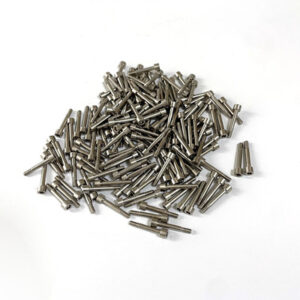
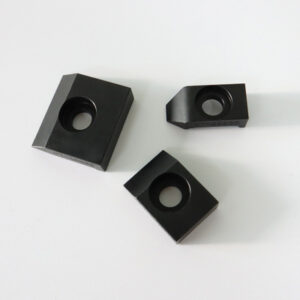
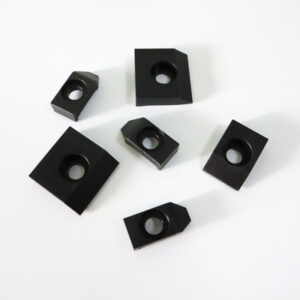
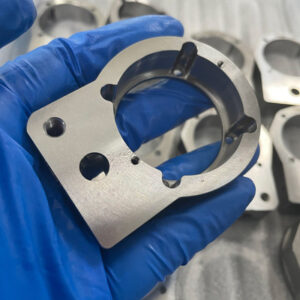
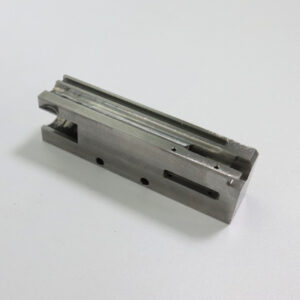
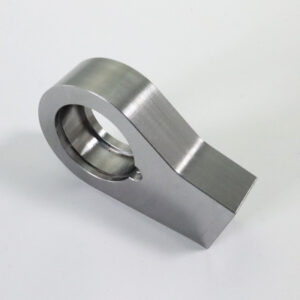
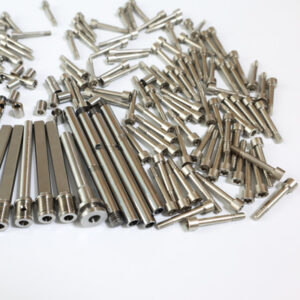
Why Choose AT for Custom CNC Machining?
Saving Your Cost
You will save 30-50% of the cost because of our efficient production capacity and cost control.
Quality Assurance
As an ISO 9001:2015 certificated manufacturing company, we offer SGS, RoHS, material certifications, and inspection report for our customers.
On-demand Production
Our CNC milling services will support you from 1 pcs to 10k+ pcs, no matter prototype, low volume manufacture, or mass production.
High Precision Tolerances
Offering tolerances range from +/-0.001′′ to 0.005′′, depending on client specifications. We are experts in producing custom components.
Material Selection
Choose from 50+ engineering-grade plastics and metals, including ABS, polycarbonate, nylon, PEEK, aluminum, stainless steel, platinum, and Steel for diverse part applications and industries.
Fast and Reliably Delivery
Experience dependable and punctual delivery of your products from our CNC facility strategically located in Shenzhen, China, near major shipping ports for seamless transportation and peace of mind.
CNC Machining Steel FAQs
CNC machining steel offers several advantages, including high strength, durability, and versatility.
Steel is a commonly used material in many industries due to its excellent mechanical properties, which makes it ideal for many applications. CNC machining allows for the precise and accurate shaping of steel parts, making it a reliable and efficient manufacturing process.
CNC machining offers precise, efficient, and versatile steel part production, making it a popular choice for industries such as aerospace and medical.
It enables tight tolerances and repeatable cuts, producing highly precise manufacturing.
With the ability to run continuously and produce identical parts, CNC machining is fast and efficient, especially for large production runs. It can produce steel parts in various sizes, shapes, and complexities, including complex geometries and tight tolerances that are difficult or impossible to achieve with traditional machining methods.
Consistent quality and accuracy in every part produced minimize the risk of errors and scrap, resulting in increased production yields and cost savings for both large and small runs.
Complexity: Parts with complex geometries or tight tolerances require more time and effort to program and machine, which can increase costs.
Quantity: The cost per part decreases with higher production runs due to economies of scale, while smaller runs may have a higher per-part cost.
Finishing: Additional finishing processes such as polishing or painting can increase the cost of CNC machining.
Design changes: Design changes during the production process can add to the cost, as it may require additional programming or machining time.
Machine capabilities: The type and capabilities of the CNC machine used can also impact the cost of machining, with more advanced machines typically costing more to operate.
The maximum size of CNC machined steel parts is determined by the size of the CNC machine being used. However, most CNC machines have a maximum workpiece size of around 40 inches (1016mm) by 20 (508mm) inches by 20 inches (508mm).
